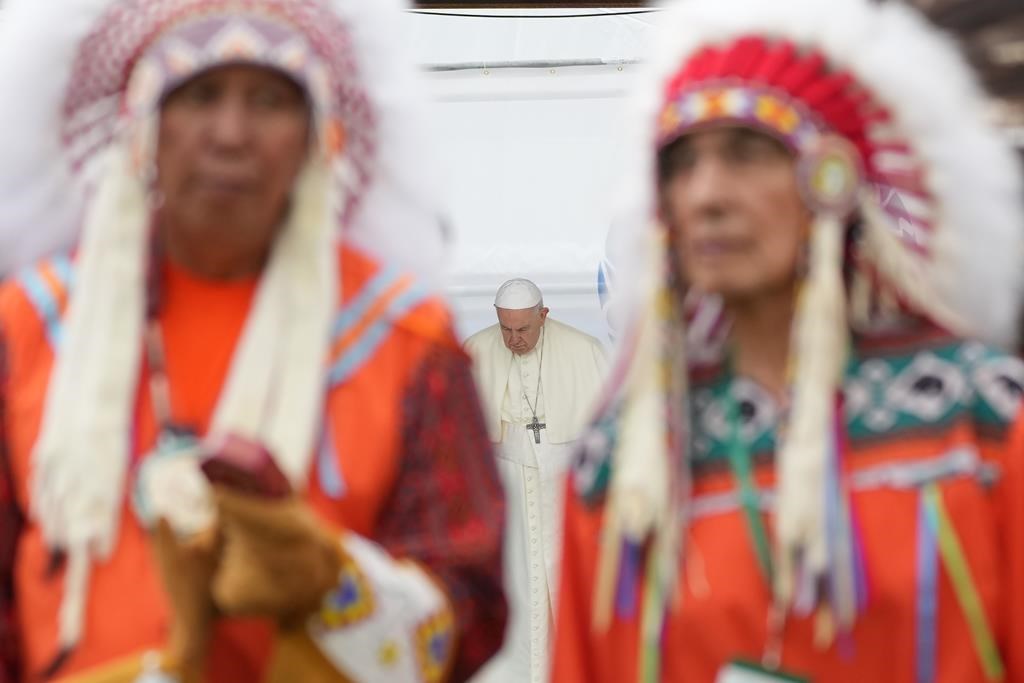‘Hallelujah’: UBCIC Grand Chief says of Vatican rejecting Doctrine of Discovery

Posted March 30, 2023 9:37 am.
Last Updated March 30, 2023 12:49 pm.
“Hallelujah” was the first word out of the Union of British Columbia Indian Chiefs (UBCIC) president’s mouth when asked how he was feeling now that the Vatican has rejected the Doctrine of Discovery.
The announcement by the Vatican comes a year after Pope Francis met with Indigenous groups in Canada and delivered his first apology for the Catholic Church’s role in residential schools.
A statement from the Vatican says the papal bulls, or decrees, “did not adequately reflect the equal dignity and rights of Indigenous peoples.”
The 15th-century doctrine was connected to the idea that lands being colonized were empty, when in fact Indigenous people had long called them home.
Speaking to CityNews, Grand Chief Stewart Phillip says the rejection is an “amazing step” but long overdue.
“It only took 500 years for us to accomplish that,” Phillip said.
“But having said that, I think it bodes well for the future of the ongoing work, in regard to reconciliation. There are so many initiatives that are in play, as we speak, in regard to reconciliation, that this is just another irrefutable development [in relation to] our colonial mindset, and to racism. The discrimination against people of color, Indigenous people, it’s time to throw that in a political dumpster of history,” he explained.
The Vatican says it was right to “recognize these errors,” acknowledge the terrible effects of colonial-era assimilation policies on Indigenous peoples, and ask for their forgiveness.
The statement was a response to decades of Indigenous demands for the Vatican to formally rescind the papal bulls that provided the Portuguese and Spanish kingdoms the religious backing to expand their territories in Africa and the Americas for the sake of spreading Christianity.
Those decrees underpin the “Doctrine of Discovery,” a legal concept coined in a 1823 U.S. Supreme Court decision that has come to be understood as meaning that ownership and sovereignty over land passed to Europeans because they “discovered” it.
Phillip says the rejection by the Holy See will strengthen Indigenous peoples’ legal battles when it comes to land and title claims, adding that, “At the end of the day, it’s a win for everyone.
“It’s another step forward in building a better country and a better society for all who choose to make their home in Canada.”
Related Articles:
-
Pope to be hospitalized for several days for lung infection: Vatican
-
Pope expands sex abuse law, reaffirms adults can be victims
-
Pope Francis’s tour came with a minimum $55-million price tag for Ottawa
The doctrine was cited as recently as a 2005 Supreme Court decision involving the Oneida Indian Nation written by the late Justice Ruth Bader Ginsburg.
During Pope Francis’ 2022 visit to Canada, where he apologized to Indigenous peoples for the residential school system that forcibly removed Native children from their homes, he was met with demands for a formal repudiation of the papal bulls.
Phillip notes it was that pressure brought forward by Indigenous leaders and Elders that brought the “brutal history” of colonialism and neo-colonialism to light.
“I think it is precedent-setting,” Phillip explained, adding that the move brings out of the dark the “violence [and] racism” and will make “this a better country.”
Two Indigenous women unfurled a banner at the altar of the National Shrine of Sainte-Anne-de-Beaupré on July 29 that read: “Rescind the Doctrine” in bright red and black letters. The protesters were escorted away and the Mass proceeded without incident, though the women later marched the banner out of the basilica and draped it on the railing.
In the statement, the Vatican said: “In no uncertain terms, the church’s magisterium upholds the respect due to every human being. The Catholic Church therefore repudiates those concepts that fail to recognize the inherent human rights of Indigenous peoples, including what has become known as the legal and political ‘doctrine of discovery.’”
Phil Fontaine, a former national chief of the Assembly of First Nations in Canada who was part of the delegation that met with Francis at the Vatican before the trip and then accompanied him throughout, said the statement was “wonderful,” resolved an outstanding issue and now puts the matter to civil authorities to revise property laws that cite the doctrine.
“The Holy Father promised that upon his return to Rome they would begin work on a statement which was designed to allay the fears and concerns of many survivors and others concerned about the relationship between their Catholic Church and our people, and he did as he said he would do,” Fontaine told The Associated Press.
“The church has done one thing, as it said it would do, for the Holy Father. Now the ball is in the court of governments, the United States and in Canada, but particularly in the United States where the doctrine is embedded in the law,” he said.
The Vatican offered no evidence that the three papal bulls (Dum Diversas in 1452, Romanus Pontifex in 1455 and Inter Caetera in 1493) had themselves been formally abrogated, rescinded or rejected, as Vatican officials have often said. But it cited a subsequent bull, Sublimis Deus in 1537, that reaffirmed that Indigenous peoples shouldn’t be deprived of their liberty or the possession of their property, and were not to be enslaved.
Cardinal Michael Czerny, the Canadian Jesuit whose office co-authored the statement, stressed that the original bulls had long ago been abrogated and that the use of the term “doctrine” — which in this case is a legal term, not a religious one — had led to centuries of confusion about the church’s role.
The original bulls, he said, “are being treated as if they were teaching, magisterial or doctrinal documents, and they are an ad hoc political move. And I think to solemnly repudiate an ad hoc political move is to generate more confusion than clarity.”
He stressed that the statement wasn’t just about setting the historical record straight, but “to discover, identify, analyze and try to overcome what we can only call the enduring effects of colonialism today.”
It was significant that the repudiation of the “Doctrine of Discovery” came during the pontificate of history’s first Latin American pope. Even before the Canadian trip, the Argentine pope had apologized to Native peoples in Bolivia in 2015 for the crimes of the colonial-era conquest of the Americas. It was issued while he was in the hospital Thursday with a respiratory infection.
Cardinal José Tolentino de Mendonça, prefect of the Vatican’s culture office, said the statement was a reflection of the Vatican’s dialogue with Indigenous peoples.
“This Note is part of what we might call the architecture of reconciliation and also the product of the art of reconciliation, the process whereby people commit to listening to each other, to speaking to each other and to growth in mutual understanding,” he said in a statement.
–With files from Cole Schisler








